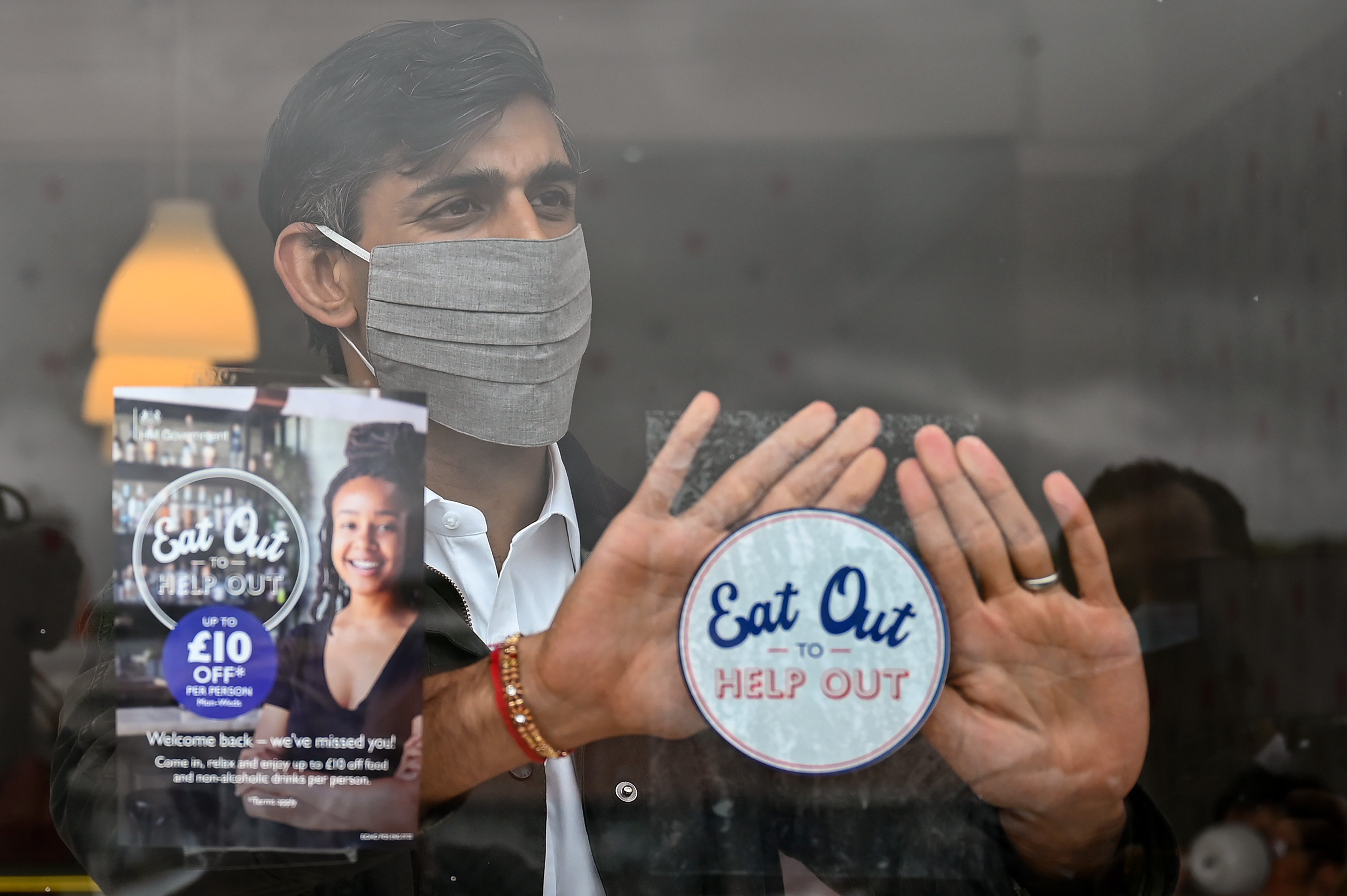‘Eat out to get Covid’: Is this the real reason Rishi Sunak wants to hold back the WhatsApps?
The former chancellor’s Eat Out to Help Out scheme helped to lift the post-lockdown gloom, but might come back to bite him as PM, writes Andrew Grice


The Covid pandemic turned Rishi Sunak from someone who was virtually unknown outside the Westminster bubble to a politician everyone knew, and most people had reason to like.
The normal image of an austere chancellor trying not to spend money was miraculously transformed; he threw £400bn at the pandemic. His furlough scheme matched the gravity of the crisis, saving thousands of jobs and businesses. His Eat Out to Help Out scheme launched in August 2020 and helped to lift the gloom, temporarily at least. As people enjoyed their discounted meals, many said “thanks, Rishi” or saw his name on menus and posters.
Now, however, some at Westminster are wondering whether his scheme – designed to boost the economy and hospitality industry and reduce the public’s “fear factor” – is about to return to haunt the man who went on to become prime minister.
Academics found that it caused a “significant” increase in Covid cases. The University of Warwick suggested it might have been responsible for 8 to 17 per cent of newly detected Covid clusters in August and early September that year.
Sunak insists he has no regrets about his scheme. But his actions as chancellor are going to be pored over by the Covid inquiry chaired by Baroness Hallett. For all the headlines about the government's refusal to hand over Boris Johnson’s notebooks and WhatsApp messages in full, is its unprecedented decision to go for judicial review against an inquiry it set up not about Johnson, but about Sunak?
There is a clue in the 150 questions the inquiry sent to Johnson.
They include: “What discussions did you have with the then chancellor, about the Eat Out to Help Out scheme prior to its implementation in August 2020? Did you support the introduction of the Eat Out to Help Out scheme at the time? Did you consider at the time, the potential impact of the scheme on the number of Covid-19 infections?
“Did you ascertain whether the Treasury had sought or received scientific advice in respect of its Eat Out to Help Out scheme prior to its implementation? If not, did you advise the then chancellor or the Treasury that such scientific advice should be sought? If not, why not?”
Inevitably, the inquiry will ask the same questions of Sunak. Despite ministers’ repeated statements that they were “following the science”, it seems that the Scientific Advisory Group for Emergencies (Sage) was not asked in advance about a scheme it regarded as “epidemiologically illiterate”.
We already know, thanks to the mountain of leaked WhatsApp messages from Matt Hancock, that the then health secretary was aware of a “serious” jump in Covid cases in some of the worst-hit areas after Sunak’s scheme – which he dubbed “eat out to help the virus get about” – and said he “kept it out of the news”.
Surely, a matter of interest to the inquiry?
Of course, internal government documents, such as cabinet committee minutes, about the programme will be supplied to the inquiry. But could Sunak’s personal communications make his position look worse?
We know that Sunak thinks the politicians handed the scientists too much power in the pandemic. “If you empower all these independent people, you’re screwed,” he said in 2022.
His scepticism about lockdowns was advertised when he claimed he stopped Johnson imposing another shutdown in December 2021. However, the inquiry is bound to question Sunak over his pivotal role in blocking a short “circuit-breaker” lockdown in autumn 2020, against Sage’s advice, because he feared mass redundancies. The government implemented one soon afterwards as cases rose.
These are not the only headaches Sunak faces from the inquiry. While it will not finish taking evidence until 2026, its first phase, on resilience and preparedness for a pandemic, might make interim recommendations before next year’s general election. Senior Tory MPs worry privately it will suggest that Tory austerity since 2010 left the UK ill-prepared. There will be plenty of questions for Jeremy Hunt, the current chancellor, to answer, thanks to his previous life as the UK’s longest-serving health secretary.
Such a verdict from Lady Hallett would make it much harder for Sunak to distance himself from the Tories’ record and would be a gift for Labour, bolstering Keir Starmer’s “time for change” message.
It’s becoming clear that the Covid inquiry is going to frustrate Sunak’s attempt to move on from the disastrous Johnson and Truss regimes. He would much rather talk about something else. But his ill-advised, politically inept decision to withhold material from the investigation, rather than trust it to redact irrelevant matters, will keep the issue in the headlines, while undermining public trust in both the investigation and the Tories. It is a hat-trick of own goals.






Join our commenting forum
Join thought-provoking conversations, follow other Independent readers and see their replies
0Comments